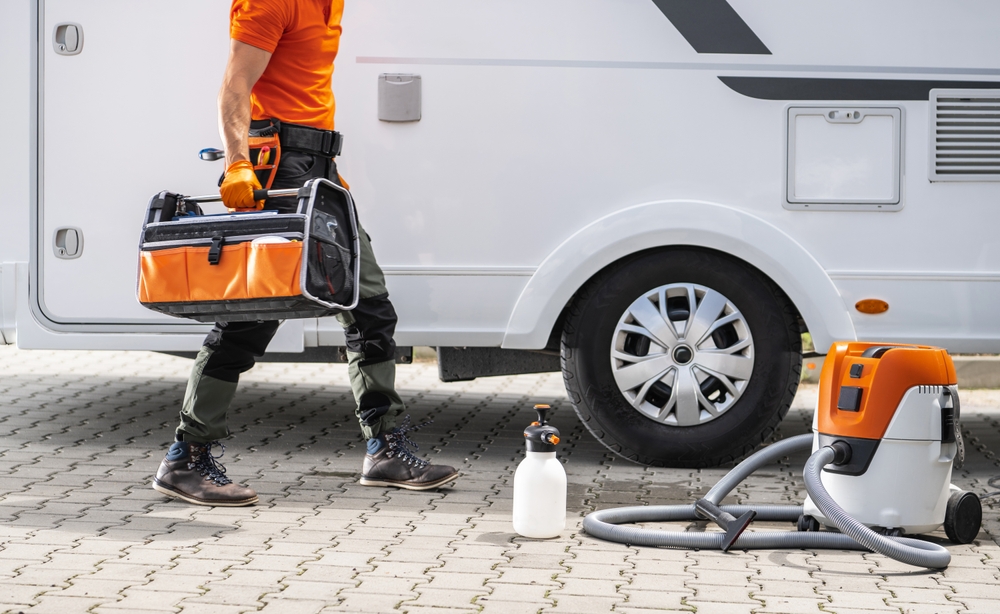RV Service Guide: When to Perform Key Maintenance
Keeping your RV in tip-top shape means more than just washing it after a trip. Proper maintenance can make the difference between years of worry-free travels and unexpected road troubles. But how often should you service your RV? From mileage to usage type, several factors come into play. Here’s a comprehensive guide to help you stay ahead of your RV's needs, so you’re always ready for your next adventure!
1. Annual Checkup: The Bare Minimum
At a minimum, plan to service your RV once a year, even if it hasn’t been on the road often. An annual inspection should include:
- Fluids and Oil Change: For motorized RVs, change the oil and filter annually if you’ve used it sparingly, but consider every 3,000-5,000 miles if you’re frequently on the road.
- Battery Inspection: Batteries can lose charge over time, especially in storage. Test your batteries’ health and add distilled water if necessary.
- Seals and Roof Inspection: The roof, windows, and doors can develop leaks over time. Regularly inspect seals to prevent water damage—a top culprit for costly repairs.
- Propane System Inspection: Annual propane checks by a certified technician help prevent leaks and ensure safe, efficient operation of appliances.
2. Every 3,000-5,000 Miles: Essential Maintenance for Motorized RVs
For those traveling consistently, some tasks need more frequent attention:
- Oil and Filter Change: If you’ve clocked 3,000-5,000 miles, it’s time to change the oil. Consistent oil changes extend engine life and keep it running smoothly.
- Tire Inspection and Rotation: Tires should be checked for tread wear, pressure, and alignment every 5,000 miles. Properly maintained tires can save you from blowouts on the road.
3. Based on Seasonal Use: Tailoring Maintenance to Your Travel Patterns
Depending on how you use your RV, here are some guidelines:
- Weekend Warriors (Short, Frequent Trips): Check tire pressure, fluid levels, and lights before each trip. A quarterly deep-clean and systems check is ideal.
- Full-Timers and Extended Travelers: If you’re on the road for weeks or months, have a routine for checking key systems monthly. Air filters, fluids, and tire condition should be monitored consistently.
- Seasonal or Occasional Users: If you store your RV for months at a time, schedule a post-storage inspection. After winter storage, de-winterize the water system, check for pests, and ensure systems are operational.
4. RV Type Matters: Travel Trailers vs. Motorhomes
Each RV type has its specific needs:
- Travel Trailers and Fifth Wheels: Focus on towable-specific maintenance. Inspect brakes, bearings, and hitch mechanisms regularly. Bearing repacking is essential every 10,000 miles or at least once a year.
- Motorhomes: In addition to oil changes, motorized RVs require periodic inspections of belts, hoses, and the drivetrain. Cooling and transmission fluids should be topped off and replaced per manufacturer recommendations.
5. Critical Systems and Their Service Intervals
Let’s break down some critical systems and how often they need attention:
- Brake Inspection: Brakes should be inspected every 10,000 miles or annually, especially for travel trailers and fifth wheels.
- Air Conditioning: Clean the filters and coils once or twice a season. For full-timers, more frequent cleaning may be necessary.
- Water Heater and Plumbing: Drain and flush your water heater at least annually. Sanitizing the freshwater system every six months prevents bacteria buildup.
- Generator: Check the oil every 100 hours of use. Generators left idle too long may need servicing more often due to fuel gumming.
6. Mileage-Based vs. Time-Based Maintenance: Which to Prioritize?
If you’re clocking high mileage, stick to mileage-based maintenance intervals. However, if your RV spends most of its time in storage, prioritize time-based checks, as issues like corrosion and battery drain can still occur without regular use.
Final Thoughts
Your RV is a home on wheels, deserving the same care and attention as any vehicle or living space. Adopting a routine for seasonal, mileage, and annual maintenance tasks ensures you’re always travel-ready. Taking a proactive approach keeps your RV in prime condition, preventing costly repairs and extending its lifespan for years of adventures.


